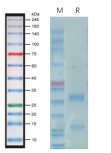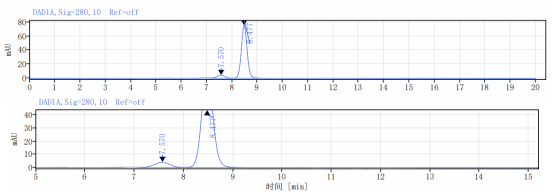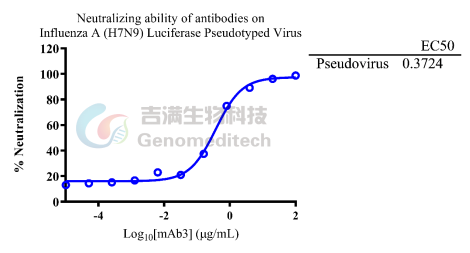Cat. No.:GM-87831AB
Product:Anti-H7N9 hIgG4 Antibody(mAb3)
Cat. No.:GM-87831AB
Product:Anti-H7N9 hIgG4 Antibody(mAb3)
GM-87831AB-10 10 μg
GM-87831AB-100 100 μg
GM-87831AB-1000 1mg
Species Reactivity Human
Clone mAb3
Source/Isotype Monoclonal human IgG4,λ
Application Neutralization Assay
Specificity Detects H7N9
Gene H7N9
Background H7N9 is an avian influenza virus that was first discovered in China in 2013. While it primarily infects birds, it can also infect humans,In vaccine development, the application of H7N9 antibodies has become an important area of research aimed at providing effective prevention and control measures. These specific H7N9 antibodies not only help in understanding the immune response but can also be used to develop vaccines against H7N9. By studying the antibodies generated in infected individuals, scientists can identify effective antigens, providing critical data for vaccine design.Moreover, antibodies against H7N9 can also be used to treat infected individuals. By developing monoclonal antibodies, these antibodies can enhance the immune response of the infected person, improving their ability to fend off the pathogen. Therefore, the dual application of H7N9 antibodies in vaccine development and treatment is crucial in combating H7N9 virus infections and can provide strong support for public health responses.
Storage Store at 2-8℃ short term (1-2 weeks).Store at ≤ -20℃ long term. Avoid repeated freeze-thaw.
Formulation Phosphate-buffered solution, pH 7.2.
Endotoxin < 1 EU/mg, determined by LAL gel clotting assay



Cat. No.:GM-87831AB
Product:Anti-H7N9 hIgG4 Antibody(mAb3)
GM-87831AB-10 10 μg
GM-87831AB-100 100 μg
GM-87831AB-1000 1mg
Species Reactivity Human
Clone mAb3
Source/Isotype Monoclonal human IgG4,λ
Application Neutralization Assay
Specificity Detects H7N9
Gene H7N9
Background H7N9 is an avian influenza virus that was first discovered in China in 2013. While it primarily infects birds, it can also infect humans,In vaccine development, the application of H7N9 antibodies has become an important area of research aimed at providing effective prevention and control measures. These specific H7N9 antibodies not only help in understanding the immune response but can also be used to develop vaccines against H7N9. By studying the antibodies generated in infected individuals, scientists can identify effective antigens, providing critical data for vaccine design.Moreover, antibodies against H7N9 can also be used to treat infected individuals. By developing monoclonal antibodies, these antibodies can enhance the immune response of the infected person, improving their ability to fend off the pathogen. Therefore, the dual application of H7N9 antibodies in vaccine development and treatment is crucial in combating H7N9 virus infections and can provide strong support for public health responses.
Storage Store at 2-8℃ short term (1-2 weeks).Store at ≤ -20℃ long term. Avoid repeated freeze-thaw.
Formulation Phosphate-buffered solution, pH 7.2.
Endotoxin < 1 EU/mg, determined by LAL gel clotting assay


